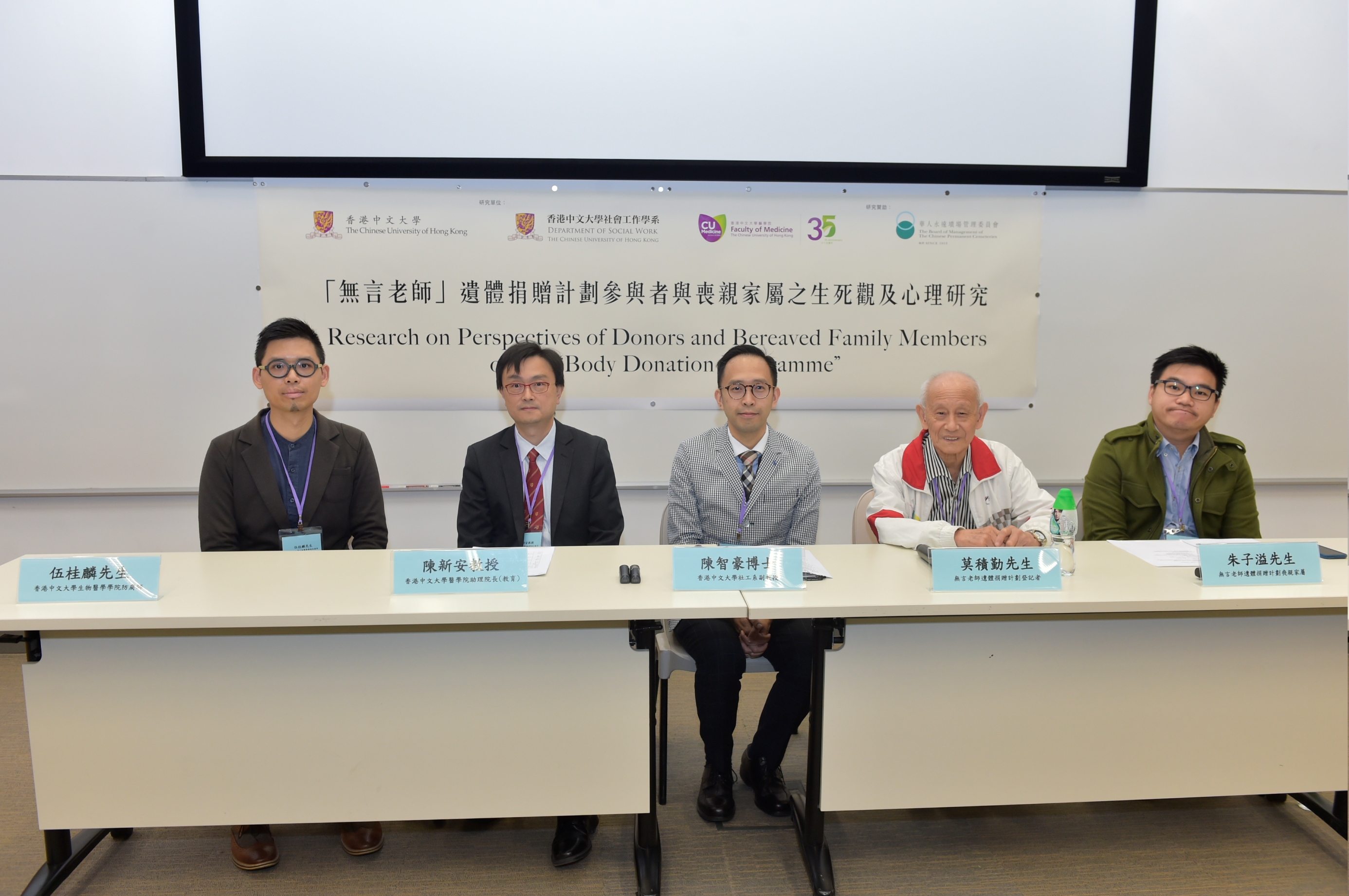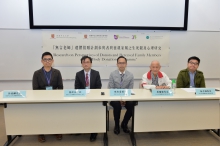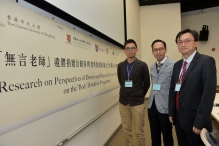CUHK
News Centre
CUHK Releases Research Results on Perspectives of Body Donation Registrants and Bereaved Family Members on Body Donation Programme
The Department of Social Work and the Faculty of Medicine of The Chinese University of Hong Kong (CUHK) have collaborated since last year to conduct a study on the views of registered body donors and bereaved families on the ‘Silent Teachers Body Donation Programme’. The results indicate that a majority of registrants hope to contribute to medical education with their bodies after death. Over 80% of registrants have informed their families of the donation decision, while 16% of them have not. Among the latter group, some might face more challenges over life and death views and in family relations. Furthermore, the process of body donation may also have an impact on the grieving process of the bereaved families.
The Faculty of Medicine of CUHK launched the ‘Silent Teachers Body Donation Programme’ in 2011 to encourage people to donate their bodies after death to provide training opportunities for medical students who can also learn to be grateful and respectful to life. Since then, over 10,000 donors have registered for the programme.
The programme has been successful with the generous support of various parties, including The Board of Management of The Chinese Permanent Cemeteries (BMCPC) which supported the establishment of a ‘Silent Teachers’ memorial wall at the Garden of Remembrance in Junk Bay Chinese Permanent Cemetery, and sponsored the enhancement of anatomy teaching and services in the Dissecting Laboratory. With an aim to further improve the programme and provide better services to bereaved families, BMCPC also supported the Department of Social Work and the Faculty of Medicine to conduct a one-year study on the programme.
To understand the views of family members
Previous studies have mainly focused on investigating the motivations of registrants and their values on life and death. Views of the bereaved families and their reasons for supporting the donors have not been thoroughly examined. Currently in Hong Kong, registration of body donation is not legally binding. The next of kin hold the right to make a final decision on after-death body arrangements. It is not uncommon for family members of the deceased body donors to refuse to donate the body. So, to understand how registered body donors communicate with their families and what bereaved family members think about body donation is of equal help in further promoting the programme.
In this study, 11 body donation registrants and 10 bereaved family members of the deceased donors were interviewed from December 2015 to October 2016. 1,070 body donation registrants were also invited to complete an online survey from August 2016 to September 2016.
During the interviews, all bereaved family members supported the programme and gave positive feedback. They understood the motivations and wills of the deceased donors who had communicated with them on the programme objectives. However, since the donated bodies had to be used for medical education for a certain period of time (varying from a few months to two years), some of the bereaved family members experienced a relatively prolonged grieving process until the bodies of the deceased were returned and cremated.
Relationships and communications between donors and family members
According to the online survey results, the mean age of the registrants was 46.8, 68.5% were female and 48.2% were without religion. Over 90% of the registrants agree with the following three major reasons for joining the programme: 1. Utilization of their own dead body (98.8%), 2. Provision of opportunity to medical students to practice medical techniques (98.0%). 3. Provision of opportunity to medical students to understand the real human body (97.9%). About their views on life and death, 98.3% of the participants hope to simplify dead body arrangement (e.g. rituals and procedures in after death arrangement), and 83% strongly agree that the dead body is just a shell.
On the intimacy level with family members, the mean score of registrants was 4.15 (in a scale of 1 to 5; a rating of 5 indicates the highest level of intimacy with family members). About 80% of the survey participants have communicated with their family members about their donation decision, of whom 32.9% told their family members after registration. Only 16% of participants have not communicated with their families before or after registration, believing that: 1. Family’s opinions would not affect one’s own decision (96%). 2. The decision should be solely made by the donor (89.3%).
The results also show that family communication correlates with the intimacy of the registrant’s relation with the family. The higher the level of intimacy with family members, the higher the tendency to communicate the donation decision to family members. Comparing two groups of registrants with and without communication with family members on their decision on body donation, the former group experiences a significantly higher level of meaning in life, a better quality of life, and a lower level of death anxiety than the latter (see Table).
Life and death education and family communication should be enhanced
Dr. Chan Chi-Ho, Wallace, Associate Professor from the Department of Social Work, CUHK, remarked, ‘The research results indicate that the majority of body donation registrants hope to contribute to medical education with their bodies after death. For registrants who have not communicated with their families about their decision on body donation, some may experience challenges on life and death issues, as well as family relationships. In future, we suggest emphasizing life and death education and family communication in the promotion of the “Body Donation Programme”. Body donation should be a mutual decision made by both donors and their families.’
Prof. Chan Sun On, Hector, Assistant Dean from the Faculty of Medicine, CUHK said, ‘The Faculty of Medicine plans to provide further support to the bereaved family members on after-death arrangements. We will also collaborate with the Department of Social Work to recruit medical students and social work students to reach out to some of the registered body donors and their family members to enhance their understanding of body donation and provide necessary support in psychosocial needs and family communication.’
The research results are also available at:
http://web.swk.cuhk.edu.hk/~swk/Research/research.html
For further details of the ‘Silent Teachers Body Donation Programme’, please visit: www.sbs.cuhk.edu.hk/bd/
Mr. Mok (2nd right) and Mr. Chu (1st right) share their views and experience as a registered body donor and a bereaved family member respectively.
(From right) Prof. Chan Sun On, Hector, Assistant Dean from the Faculty of Medicine; Dr. Chan Chi-Ho, Wallace, Associate Professor from the Department of Social Work; and Mr. Pasu Ng, coordinator of the body donation programme, Faculty of Medicine, introduce the research results on the ‘Silent Teachers Body Donation Programme’.





